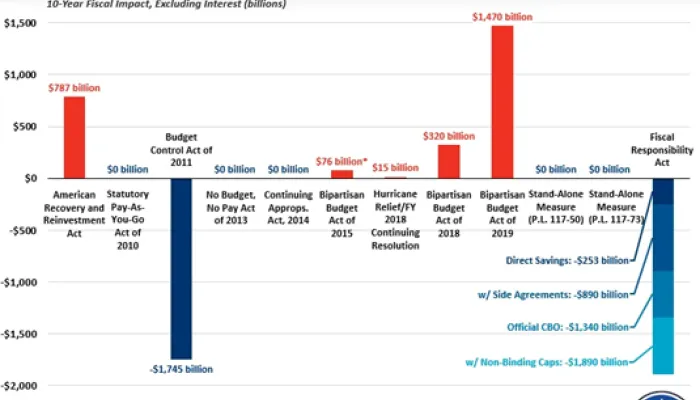Upcoming Congressional Fiscal Policy Deadlines
Updated 3/28/2025: The President signed a continuing resolution (H.R. 1968) on March 15, 2025, that runs through September 30, 2025. Our analysis of this spending bill can be found here.
The next few years will include several predictable fiscal policy deadlines that will force congressional action. Many of the deadlines could bring additional costs if Congress acts irresponsibly, or they could present an opportunity for Congress to reduce deficits.
We will regularly update this tracker to help reporters, congressional staff, and others interested in fiscal policy keep tabs on major deadlines. We recommend that you bookmark it and come back to check in.
Congress may be compelled to act on each of these dates or enact short-term extensions or policy modifications to move the deadlines to buy time for action.
| Issue | Deadline | More Information |
|---|---|---|
| Debt Limit Returns | January 2, 2025 | Debt limit suspension ended on January 2, 2025; CBO estimates extraordinary measures will allow the government to meet its obligations until at least August. The "X" date is difficult to pinpoint and so will need to be closely monitored by Congress and the Administration. The Bipartisan Policy Center projects the "X" date will land between July and October. |
| Authorization of TANF & Related Programs Expires | September 30, 2025 | As part of the most recent continuing resolution, the Temporary Assistance for Needy Families (TANF) Program was extended through September 30. |
| Medicare/Medicaid Policies & Health Care Extenders | September 30, 2025 | Various Medicare & Medicaid policies and health care extenders expire on September 30. This includes extension of Community Health Centers, Graduate Medical Education Programs, and Medicare payments for Low-Volume Hospitals. |
| National Flood Insurance Program Authorization Expires | September 30, 2025 | The most recent CR extended the NFIP through September 30. After that date, existing policies would continue to be serviced, but FEMA would be unable to renew existing policies or issue new policies unless NFIP authority is extended. More on NFIP. |
| Fiscal Year Ends / FRA Spending Caps Expire | September 30, 2025 | Statutory discretionary spending caps enacted in the Fiscal Responsibility Act expire. (Targets for spending that are not backed by sequestration remain through FY 2029.) |
| Agriculture and Nutrition Programs | September 30, 2025 | The most recent farm bill expired at the end of FY 2023, including crop insurance, nutrition programs such as SNAP, rural development, and agricultural research and conservation programs; the December CR extended mandatory farm bill programs through FY 2025. Commodity programs are extended through the calendar year. |
| TCJA Individual Tax Cuts Expire | December 31, 2025 | TCJA individual income tax provisions expire. Lawmakers are discussing enacting TCJA extensions through the reconciliation process. See our Reconciliation Resources. |
| Expanded ACA Subsidies Expire | December 31, 2025 | The American Rescue Plan temporarily increased premium tax credits for assistance in buying health insurance from state-based marketplaces created by the ACA and expanded eligibility for premium tax credits to individuals with incomes exceeding 400 percent of the federal poverty line, but only through the end of 2022. The Inflation Reduction Act extended those subsidies for three years, through 2025.) |
Longer-Term Deadlines
- End of FY 2026: Surface transportation programs authorization provided by Infrastructure Investment and Jobs Act expires; Export-Import Bank authorization expires
- End of FY 2027: Maternal, Infant, & Early Childhood Home Visiting expiration, Food & Drug Administration user fee programs expiration
- FY 2028: Highway Trust Fund insolvency; FAA authorization expires
- FY 2033: Social Security Old-Age and Survivors Insurance (OASI) Trust Fund exhaustion (combined OASI and SSDI exhaustion date is 2035).
- FY 2036: Medicare Hospital Insurance (Part A) Trust Fund exhaustion. The Medicare Trustee Report forecasts insolvency in 2036.


